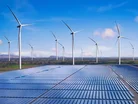Africa: A sustainable energy journey reducing fossil fuels

Africa’s renewable energy sector shows uptake in the generation, capacity, and forecasts, a new report by PwC states.
Although many African economies remain heavily reliant on fossil fuel revenue for their national budgets, they have experienced considerable negative fiscal and economic impacts since the global COVID-19 pandemic broke out.
According to the consultancy, the continent’s fossil fuel inventories show a downturn in production, consumption, and exports between 2019 – 2020, which is largely a result of delays or cancellations of large projects due to the covid-19 pandemic, as well as global investment pressure resulting in the rapid exit of and disinvestment in portfolios.
Looking at oil, PwC data show that production significantly decreased by 19% to 6.8 mmbbl/d from the prior year. This accounts for 7.8% of global production. Consumption saw a decrease of 14% to 3.5 mmbbl/d from the prior year, and exports saw a drop to 5.7 mmbbl/d.
“Despite companies commencing exploration and development projects, planned capital expenditure in 2020–2021 fell from $90 billion pre-COVID-19 to $60 billion,” the report titled Africa Energy Review 2021 reads.
The growing renewable energy sector
Renewables are on the rise across the continent with an annual growth rate of 21% between 2010 and 2020 and a current total renewable capacity of more than 58 GW – of which hydropower contributes 63%.
The consultancy firm reports that wind energy generation increased by 14% and solar energy generation increased by 13%, while total renewable energy generation increased by 11% in 2020 compared to the previous year. Solar capacity increased by 13%, wind capacity increased by 11% and hydropower increased by more than 25% in 2020 compared to 2019.
“Most African countries are also increasing investment in solar and hydropower technologies with projects currently under construction estimated to add 33 GW of renewable energy capacity,” the review states. “Total installed renewable energy capacity in Africa has grown by over 24 GW since 2013. The continent’s capacity is expected to increase again by the end of 2021 with growth led by solar and wind projects in Egypt, Algeria, Tunisia, Morocco, and Ethiopia.”
Countries such as Egypt, Ethiopia, Kenya, Morocco and South Africa are leading the increase in renewable energy supply on the continent, while some of Africa’s smaller countries including Cabo Verde, Djibouti, Rwanda and Eswatini have set ambitious renewable energy targets. Renewable energy is on a gradual rise across the continent with an annual growth rate of 21% between 2010 and 2020 and current total renewable capacity of more than 58 GW (of which hydropower contributes 63%).
